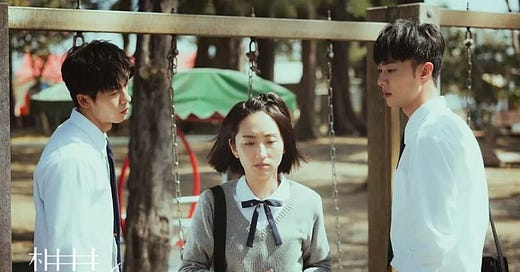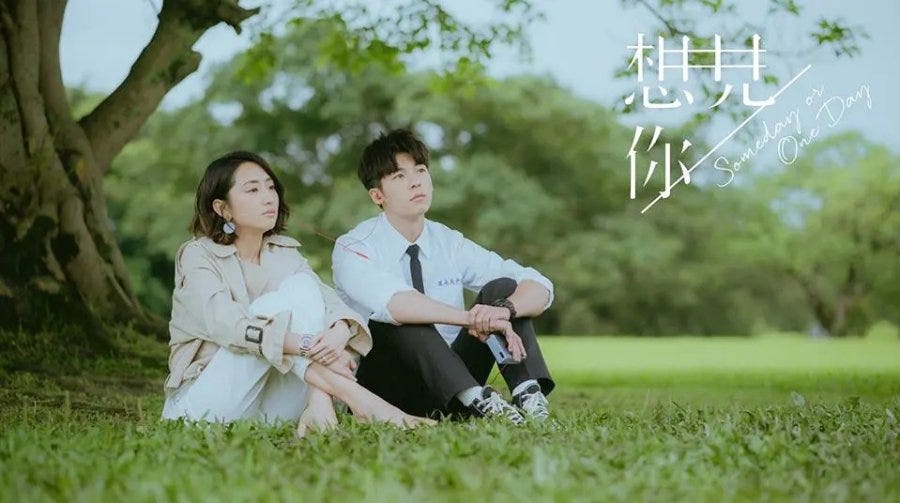Grief is a strange thing. It’s a shared human experience and yet when a person is in that state of mind, he/she is somehow convinced that they are all alone in their misery — that they’re the only ones who are in pain and no one else is capable of empathizing with them. On top of that no matter how painful it is to weather the hard times it seems far harder to let go because of all those memories we cling to for dear life lest we forget. Remembering is a double-edged sword. It can be a comfort and a celebration. It can also become a curse. A burden that leads to dark places and depression.
Huang Yuxuan (Alice Ke) is mourning for her boyfriend Wang Quansheng (Greg Xu) whose body was never recovered from an air incident two years earlier. She goes to work where she’s team leader of the marketing team and goes home to the apartment she shared with Quansheng where every nook and cranny reminds her of him. At the end of each day when no one is looking, she turns on her phone and sends messages to the absent Quansheng as if it was just another day in paradise. Part of her hangs on to the belief that somewhere he still walks the streets of Taiwan. This is her coping routine until someone sends her an old Walkman with a cassette inside.
Her look-alike is Chen Yunru, a high school student working in her uncle’s record store when two attractive young men from her school stroll in to ask about the song that she’s listening to. It’s her favourite and the more gregarious of the two Li Ziwei (Greg Xu) places an order for a copy of the album. His more gentle, introverted friend, Mo Junjie (Patrick Shi) looks on shyly. At first the entire sequence signals the start of something resembling a love triangle but also the start of something far more tragic and melancholic. The trio eventually become friends but it’s clear that though Yunru is infatuated with Ziwei, it is actually his best friend Junjie that has been observing her for quite some time. He’s the one that’s really interested in the introspective Yunru and Ziwei is merely helping things along. Though a good scholar Yunru is a troubled soul, keeping everything to herself until the lads come along. A product of dysfunctional family dynamics, her parents have been separated for sometime and they both overtly favour her bratty brother over her. It’s not hard to see why this walking cloud of gloom is instantly attracted to the impish but charming Ziwei. It may be just what the doctor ordered. It’s the playing out of conventional wisdom all over again. Opposites attract. Or so it seems. Indeed it’s the staple of most romance stories — that the introvert would naturally gravitate towards the extrovert. Unfortunately, her feelings for him aren’t reciprocated because she’s really not his cup of tea.
At a cursory glance it looks like just another high school romance melodrama where two opposites meet in high school, date and then transition into a permanent adult happily-ever-after. Not so. The name differences is the key to understanding everything. Moreover it becomes obvious through some painstaking build-up that Huang Yuxuan and Chen Yunru are two entirely different beasts. “Pain” here being the operative word. The first 4-5 episodes are a slog to get through.
So one fine day high school Yunru wakes up and gradually finds out that she’s not herself. Yes, it’s the same face in the mirror but every detail about her is different. She also has Huang Yuxuan’s memories which she initially brushes off as a particularly vivid dream. She heads off to school and meets Li Ziwei which she mistakenly calls Wang Quansheng. It doesn’t take long before the two lads notice that there’s something different about Yunru.
So what’s happened to Yunru? That’s one of the show’s great mysteries. Is Yunru now Yuxuan? Or is Yuxuan now Yunru? Or has Yuxuan done a time skippy-skip to her past? But what of the different name? Does it even matter? Soon it becomes clear that the cause of this inexplicable switcheroo is that offending Walkman containing the cassette of Yunru’s favourite song.
On the surface the narrative seems to be taking on time-honoured time skip tropes to do an ambitious re-telling of a girl meets boy in high school story. It’s all there for the viewing — transmigration, multiple timelines, doppelgangers, paradoxes — but why? Why go to all this trouble just to tell this high school romance? Unless of course this isn’t a high school romance at its core but that the high school romance is a salient vehicle to tell another — a more important story perhaps. That said, the show isn’t above using something like the “destined lovers/soulmates” trope to offer a glimmer of hope.
****Contains spoilers****
In light of that is the entreaty to let go so that grief can transform into acceptance. Yuxuan can’t let go of Quansheng as she plays out memories that they shared together over and over in her mind. Everywhere in that flat are traces of him and she’s trapped by her memories. The great love of her life was energetic and completely devoted. Yet he died too young. It’s unfair. Worse still there was a major point of contention between them before he left. Hence Yuxuan is bogged down by regrets and guilt. She’s stuck in that rut and work barely conceals her festering agony. An opportunity to relive the past and to change things is too tempting for a depressed mind to resist. But there are costs for doing so. Other people inevitably get hurt.
Yunru, on the other hand, exhibits another kind of depression. Her introversion leads her to despise her own existence, even to consider pretending to be someone else. Or worse still… contemplate suicide.
The romance in this show is unusual in that it holds out a warning to those who would see romance at any cost as an end in itself. Romance here isn’t just about two people pining for each other and pairing up as if it’s their entitled right. In fact, all of that is called into question. Is it a right to fall in love? The plot does a deep dive from the points of view of those who look on enviously feeling left out. Add mistaken identity into the mix, it’s ridiculously messy. Does it mean that just because Junjie saw Yunru first that it’s a case of “first come first served”? Does it mean that just because Yunru likes Ziwei that he is obligated to like her back? Does grief give anyone the right to do whatever they want? Even living out someone else’s life? Even if it infringes on someone else’s agency?
That notion of entitlement is a fascinating one in light of our propensity to throw the word “deserve” around with happy but thoughtless abandon. How often have we heard someone say “you deserve to be happy” or “you deserve better” and felt uneasy. Perhaps it’s only me. Why would anyone say something like that? It begs the question if we’re not in effect setting up unrealistic expectations… or not equipping our younger generation for the more unpleasant realities of life. This assumes that people know what they want. Or that their motives are impeccable. This assumes too that life should be smooth sailing to the point that you can get whatever you want whenever you want it if you do XY and Z. I haven’t got the data but I wonder if that accounts for some of the sky high rates of depression among our young today. The show itself makes the point in the finale that unrealistic expectations of those around us can lead to abject disappointment or even despair.
As far as the so-called time hopping is concerned, it’s not air tight as it is often the case in Asian dramas. It’s not really time travel in the western sense and it’s also not the point. Plenty of shows have done this type of thing better and with more consistency. But again, that’s not the purpose. The point is to accept the fact that life doesn’t always work out the way you expect. Even with all the plotting and planning in the world. In truth, it often doesn’t. Why? Because we’re dealing with people who are prone to be unpredictable if left to make their own devices without manipulation.
Overall it’s not hard to see why this popular Taiwanese series has achieved so much acclaim. Not so much for its novel use of narrative devices or even occasionally turning them on their respective heads but for how the main themes of the story culminate in a satisfying finish.
If you found this post beneficial or enjoyable, please like, share or leave a comment below.





I think what I appreciated most about this particular drama was the way they didn't flinch from tacking such difficult and complicated topics. Chen Yunru's outlook is beyond bleak and it's like she's a black hole of despair. But that's what severe depression and extremely low self esteem can look like. It was hard to watch her scenes sometimes, but I'm glad they didn't shy away from it because it's an honest presentation of how depression can warp people's thoughts and perspective. And that's not something we see often in tv where such things tend to be sensationalized, swept under the carpet, and/or used as plot points.
I think "you deserve better / to be happy" is a very Western concept. At least here in the States, I think it's sometimes used to comfort someone going through a difficult situation and could be used to justify taking actions that would improve that situation. I'm purely speculating here. Personally, it's not a phrase I would use to encourage "the grass is always greener on the other side" type of mentality.
Thanks for yet another insightful post, and I hope you feel better soon!